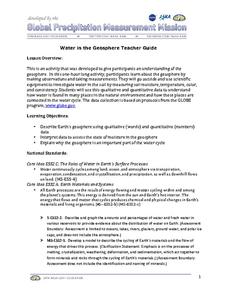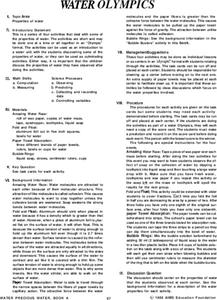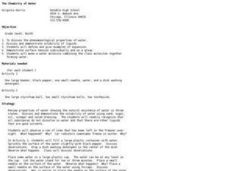University of Waikato
Water Molecules in Drama
The state of molecules is changing. Young actors and actresses perform the process of phase change in front of the class. They assume the roles of water molecules and, as a group, show how the behavior of the molecules in the solid,...
Baylor College
What Makes Water Special?
Get close up and personal with a drop of water to discover how the polarity of its molecules affect its behavior. Elementary hydrologists split and combine water droplets, and also compare them to drops of oil. Much neater than placing a...
Curated OER
Water in the Geosphere
Through a PowerPoint presentation and the embedded animation and video, earth science enthusiasts find out about the moisture in the soil beneath our feet. In the animation, follow a water molecule on its path through the water cycle. As...
Curated OER
Student Reading - The Unique Properties of Water
Without water there would be no life on this planet. Biology learners find out why by reading this handout. Create a worksheet of questions to answer after the reading. Follow it up with quick demonstrations or laboratory activities that...
Curated OER
The Water Cycle
Your class sets up a mini water cycle model to examine the process. Then they watch an animation, following a water molecule through the cycle. A well-developed lab sheet guides learners through the lesson and a PowerPoint presentation...
Curated OER
Drops on a Penny
A helpful worksheet describes an interesting demonstration on the surface tension of water. Learners guess how many drops of water the heads side of a penny will hold. This resource does a great job of describing just how a penny can...
Curated OER
Water Olympics
A fascinating and engaging lesson on the properties of water awaits you. In it, learners engage in four activities that are designed to teach about the properties of water. This exciting plan has worksheets embedded in it which make the...
American Chemical Society
Why Does Water Dissolve Salt?
Individuals explore solubility by modeling how water dissolves salts. They then view a video and compare how well water and alcohol dissolve salts, relating their comparisons to the structure of each molecule.
National Park Service
The Water Cycle Game
Take young scientists on a trip through the water cycle with this interactive science activity. After setting up a series of ten stations representing the different places water can be found, children use the included printable dice to...
American Chemical Society
Density of Water
We know solids have a density we can measure, but what about liquids? Lesson explores this concept and allows scholars to explore the relationship between volume and density. Graphing and analysis questions round out the activity.
Curated OER
The Chemistry of Water
Students investigate the properties of water. In this chemistry of water lesson plan, students observe a demonstration of the properties of water using sand, sugar, oil, vinegar and salad dressing. Students experiment with water, pepper,...
American Chemical Society
Mysterious M&M's
The first in a six-lesson mini unit, all using M&Ms® candies, this physical science activity gets kids to observe a single piece and discover what happens when it is placed in a plate of water. The activity can be used to introduce...
American Chemical Society
Why Does Water Dissolve Sugar?
Did you know that if you wait long enough, the M on the outside of an M and M will float to the surface when submerged in water? Learners observe the sugar coating of an M and M while it is dissolving in water. They explain how this...
American Chemical Society
Molecules Matter
Did you know that jumping spiders sometimes wear water droplets as hats? A seventh grade science lesson plan introduces the concept of what makes up water: tiny molecules that are attracted to each other. Starting with a chemistry...
Curated OER
Drops on a Penny
Young scientists explore the concept of surface tension at is applies to water. In this activity, learners use a dropper to place drops of water on a penny. Each group guesses how many drops a heads-up penny will hold, then conducts the...
NASA
The Case of the Wacky Water Cycle
Join the tree house detectives in learning about the processes of the water cycle, water conservation, water treatment, and water as a limited resource.
American Chemical Society
Surface Tension
A drop of dew holds a sphere shape even when sitting on a seat thanks to the surface tension of water. Learners observe the phenomena of surface tension in water. Through demonstrations, hands-on activities, and discussions they explore...
American Chemical Society
Can Liquids Dissolve in Water?
How does food coloring work? Classes watch a demonstration showing liquids dissolving in liquids. In groups, they then explore the ability of other liquids to dissolve in water (alcohol, mineral oil, and corn syrup) by setting up and...
SRI International
Science of Water
Water is crucial to survival. Scholars gain an appreciation for water by reading about it, learning about its atomic properties, and investigating its properties through six stations in a lab activity.
Curated OER
What is Water?
Students examine water's properties. They participate in hands-on activities to show the properties of water.
American Chemical Society
Changing State: Evaporation
Why do experiments require a control? Guide scholars through designing an experiment to see what they can do to evaporate water faster with a instructional activity that stresses the importance of controlling all variables. The second...
Curated OER
Water 1: Water and Ice
Students experiment with states of matter with water and ice. In this states of matter lesson, students experiment to discover what happens to water as it freezes to become a solid, ice. They observe what happens when ice melts back to...
Curated OER
Aerobic/Anaerobic Respiration
Both aerobic and anerobic respiration are introduced in this succinct PowerPoint. The chemical equations for both are included. The last slides give instructions for a lab activity in which pupils use a gas sensor to measure the...
American Chemical Society
Can Gases Dissolve in Water?
Why does soda fizz when opened? Learners discuss the appearance of bubbles in soda bottles when opened. In groups, they design and complete an experiment comparing the amount of carbon dioxide dissolving in cold versus hot liquids.

























